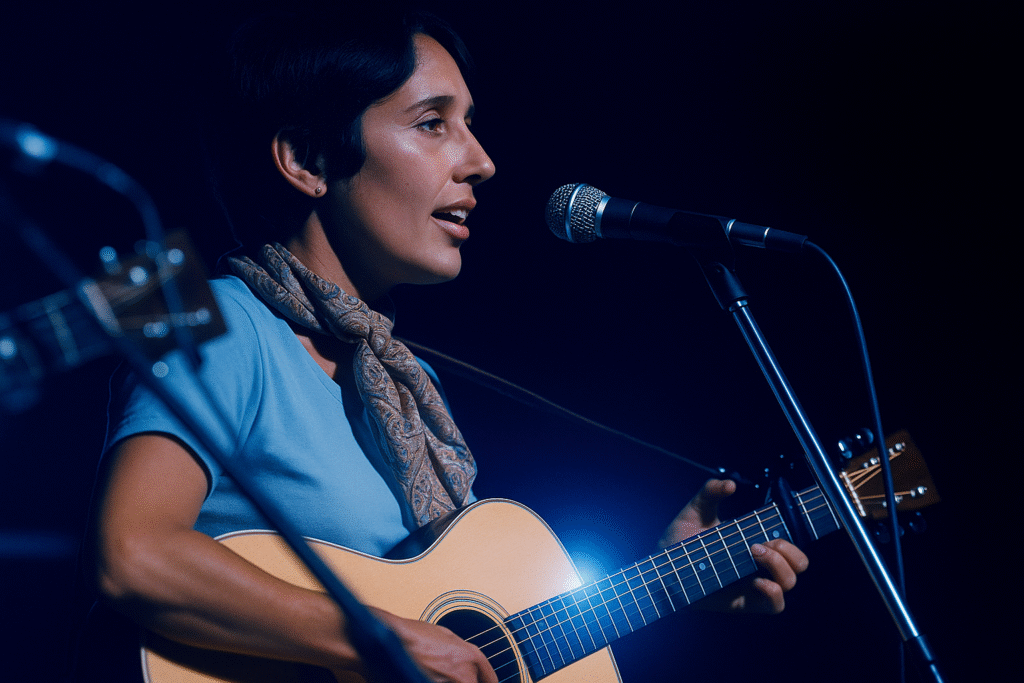
AI-generated image for illustrative purposes.
After Richie Havens’ improvised opening, Woodstock had already written itself into history. But the festival was only just beginning. On the night of August 15 and into the early morning hours, other artists took the stage, each revealing a different side of the counterculture — from intimate folk to protest songs. Three performances, in particular, became symbolic: Melanie, Arlo Guthrie, and Joan Baez.
Melanie: A Sweet Voice That Lit Candles in the Dark
In 1969, Melanie Safka was still a young singer at the start of her career. Few outside New York’s folk circuit knew her, but her shyness quickly turned into strength when she stepped onto the Woodstock stage.
By then, night had fallen, and power issues left the grounds in near-darkness. The crowd, spontaneously, began lighting candles and lighters to illuminate the field. Moved by the sight, Melanie immortalized the moment in Beautiful People, a song about unity and hope.
Her performance was short but symbolic. Songs like Birthday of the Sun revealed an artist in the making, someone who found power in vulnerability. Years later, Melanie would transform that memory into Lay Down (Candles in the Rain), one of the biggest hits of her career.
Arlo Guthrie: The Heir to a Folk Legacy
If Melanie represented freshness and innocence, Arlo Guthrie carried a legendary name. The son of Woody Guthrie — folk icon and protest troubadour of the ’30s and ’40s — Arlo had already made waves with Alice’s Restaurant Massacree (1967), a satirical, 18-minute antiwar anthem that became a generational touchstone.
At Woodstock, he took the stage in the middle of the night, clearly under the influence, stumbling over words and laughing at himself. The mic cut in and out, the sound wavered, but the crowd didn’t care. When he performed Coming into Los Angeles — a cheeky tale about smuggling drugs — it drew laughs and cheers.
Though sloppy in execution, Guthrie embodied the festival’s spirit: spontaneity, imperfection, and raw authenticity. His set reminded everyone that Woodstock wasn’t just about virtuosity — it was about celebrating freedom in all its messy, unpolished forms.
Joan Baez: Song as Resistance
If Melanie brought vulnerability and Guthrie humor, Joan Baez gave the night its solemn gravity. Six months pregnant, with her husband David Harris in jail for draft resistance, Baez took the stage like a high priestess of peace.
Already the undisputed queen of folk, known for her crystalline voice and fierce activism, she sang Joe Hill, a tribute to the executed labor organizer, and moved the crowd with Sweet Sir Galahad, written for her sister. But the climax came when she closed the night with We Shall Overcome.
Sung in unison by thousands, the civil rights anthem echoed as an act of faith in a different world. Under the drizzle that had started to fall, hands were raised high as voices merged into one. It was one of Woodstock’s most spiritual moments — a reminder that music could be both art and weapon of protest.
Between Vulnerability and Resistance
Woodstock’s second night proved the festival would not be defined solely by screaming guitars or endless jams. Melanie brought the sweetness of youth, Arlo Guthrie the offbeat humor, and Joan Baez the weight of conviction. Together, they showed that folk — often dismissed next to electric rock — could capture the very essence of 1969.
If Richie Havens had opened the festival by improvising freedom, Baez closed the night as if praying for it. At that point, Woodstock was no longer just an event. It was a collective experience where chaos, poetry, and utopia intertwined.
Burning Questions
Why didn’t Melanie become more famous after Woodstock?
She found success in the ’70s — especially with Lay Down (Candles in the Rain), inspired by the festival — but never reached the stature of Baez or Joni Mitchell.
Did Arlo Guthrie disappoint at Woodstock?
Technically, yes. But his rambling, stoned delivery captured the festival’s free-spirited energy better than polish ever could.
Was Joan Baez already a star in 1969?
Absolutely. She was folk’s leading female voice, revered as both a political force and muse of the civil rights movement.
Was “We Shall Overcome” the night’s peak?
Yes. It turned a muddy field into a spiritual congregation, merging politics, music, and emotion in a way rock history had rarely witnessed.
— Lena Blaze, Rock Vaults
